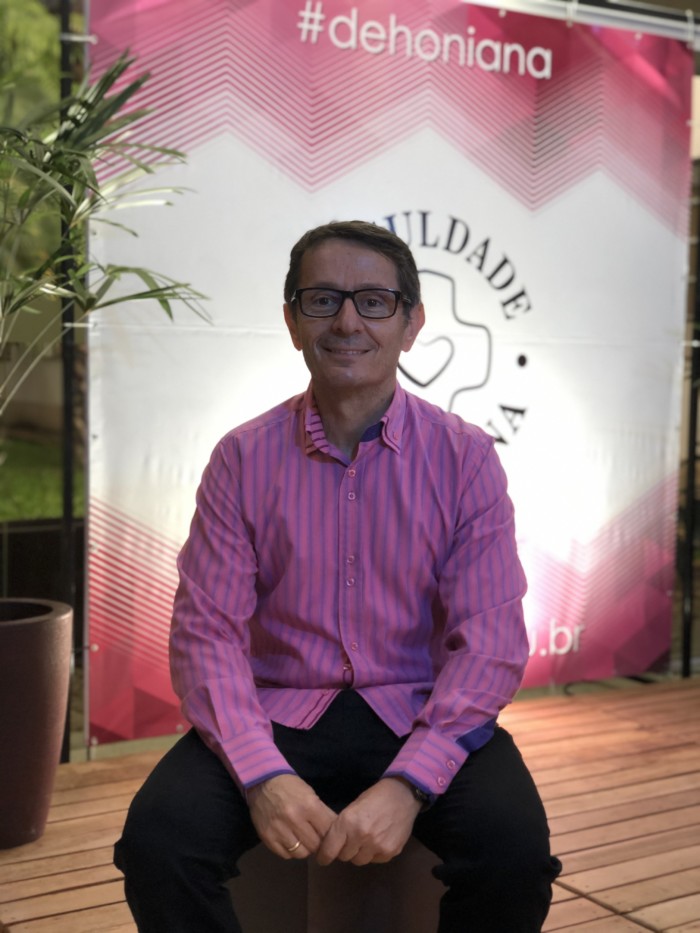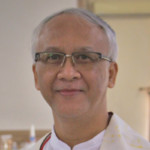Dr. Fr. Mário Marcelo Coelho, scj, is in great demand in various parts of the Brazilian Church for lectures and courses in the area of Moral Theology. He has been teaching for over 20 years at the Dehonian Seminary, where he is coordinator of the Theology courses. He is a member of the Interdisciplinary Group of Experts (GIP) of the Episcopal Pastoral Commission for the Doctrine of the Faith, of the National Conference of Brazilian Bishops (CNBB). He was recently elected president of the Brazilian Society of Moral Theology (SBTM), an institution to which he had been dedicated for many years. In this interview we will know a little more about the work and reflections of our confrere.
Mário Marcelo, we received the news of your election as President of the Brazilian Society of Moral Theology (SBTM). Could you explain, in general lines, what is the work of the SBTM?
The Brazilian Society of Moral Theology was founded in 1977 by a group of Moral Theology professors, who worked in Catholic seminaries and colleges teaching Moral Theology. The SBTM has as its main objectives: to provide a climate of reflection and encounter among moral theologians in Brazil; to offer subsidies for the study of Moral Theology; to stimulate the production of scientific papers in the area of Moral Theology; to provide dialogue between moral theologians and other scientists. Since then, Brazilian Catholic moral theologians meet in an annual congress to reflect on the ethical challenges that society and the Church live from a theological perspective.
What are the main challenges and projects to which you and the SBTM team that accompanies you in this administration intend to dedicate themselves?
In November 2021 we had the Annual Assembly of the SBTM and we reflected on the challenges for Moral Theology, especially in the “post-pandemic” context …. if we can say “post”. We felt the need to build bridges and the willingness to cross them, in view of the dialogue with different cultures, ethnicities, religions, sciences, with society and with the other, overcoming barriers and prejudices. We concluded that theological ethics must take the challenge of crossing bridges beyond the borders that separate us from other disciplines, sciences, perspectives, methods, ideologies, institutions, countries, cultures and so on. As a result, the theme for the 2022 Congress was chosen: “Crossing borders: an urgency for theological ethics today”.
Theologian Roche points out that now is the time to cross bridges: “Crossing bridges requires the courage to enter a liminal space and hope that you are welcome on the other side.” People of good will may disagree on some details, and so we all need to cross some bridges. I cross bridges to learn from other people about their experiences. I cross bridges to access resources. I discern which bridges to cross so that the dignity and beauty of marginalized people are sincerely elevated and honored.

We know that moral theology is on the front lines, in a continuous intersection between the Church’s thinking and today’s society. As religious, are we prepared to face the problems that face us?
As a first reaction I think that yes, we are prepared to face the current problems. We have a good formation program. We have studied philosophy and theology, in addition to the formation we receive in seminaries and in our communities. The philosophy and theology courses help us to reflect, discern, analyze; I can say that we are privileged. However, when we face reality I realize that it is not quite like this. If in the past knowledge was “inside the walls of seminaries and convents”, today it is “outside the walls”. The story that religious priests were the holders of knowledge no longer exists. The people who have the most knowledge are in higher education: they study, reflect, and question us about the “truths” we proclaim. They want to understand faith in an intelligent way.
Society evolves, time moves on, rapid transformations take place, and demands also change. We have a new reality of the Church in the world and we are experiencing ever faster scientific, social, political and ecclesial transformations. We are in the age of the evolution of biotechnologies, information, communication and the Internet. The world is almost virtual. Knowledge is at our fingertips. This new reality that is in front of us and that challenges us, also involves the individual who presents himself as a candidate to religious life or to the priesthood. We have questions, new problems that demand new answers, challenging not only faith, but also reason itself. It is within this context that theology and philosophy must dialogue with all currents of thought and with the various sciences.
Intellectual formation must provide all religious and clerics with a general culture adequate to the situation of each cultural, geographical, and historical context. For an effective evangelization and inculturation of the faith in today’s world, a solid philosophical, theological, and cultural preparation is indispensable. The trainee must become aware of the need to acquire appropriate conceptual tools to respond to whoever asks him about the reasons for his hope.
One last question. In what measure can moral theology contribute to religious/priestly formation today, in the face of the challenges of a diverse, plural and demanding society?.
The formation of future religious/priests needs a solid, general formation. To become a leader of a community requires not only good will and dedication, but also competence, depth and dedication. In a world where the culture of the superficial, of violence, of death prevails, in this “liquid society”, it is necessary to announce life, hope, peace, and the conditions for discernment. Father Dehon says that: “To educate a Christian is not only to give him notions of human sciences that will help him obtain social status. Before all this, it is necessary to create in him a noble and excellent character, pure habits, strong virtues. It is to form in him the faith that opens the understanding to the unseen world, the hope that strengthens the heart with the prospect of a deserved happiness, and the love that makes God perceptible through the dense clouds of life.“
From previous inspiration, I believe that our contribution lies in forming pastors deepened in academic studies, able to make a critical reading of the signs of the times and to dialogue with society, becoming light. Philosophy and theology cannot become mere private studies of faith and religion; we cannot turn them into the “subjectivization of religion or faith”, into religious relativism, a subjective adherence only to what pleases me or suits me, or even as “giving the people what the people want”, but, within the globalized.





